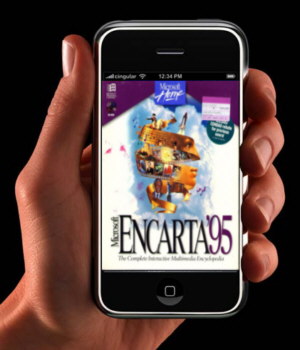Tapanes v. State, — So.3d —, 2010 WL 3488709 (Fla.App. 4 Dist. September 8, 2010) [Opinion (PDF)]
Defendant was accused of killing his new neighbor and was indicted for murder. The jury convicted him of the lesser charge of manslaughter.

One of the key concepts in the case, and mentioned specifically in the jury instructions, was whether the defenant acted with “prudence” in his dealings with the victim.
During a break from deliberations, the jury foreperson used his iPhone to access Encarta and look up the word “prudence”. Adding to this misdeed, the foreperson shared this information with the other jurors.
Based on this misconduct, defendant filed a motion seeking a new trial, and the trial court denied that motion. So defendant sought review with the Court of Appeal of Florida. On appeal, the court reversed, holding that the defendant was entitled to a new trial.
The appellate court observed that the concept of “prudence” was one that could have been key to the jury’s deliberations. Using the smartphone in this way was analogous to using a dictionary, and that conduct has generally been prohibited in juror deliberations. The appellate court found that at the very least, it could “not say that there [was] no reasonable possibility that the . . . misconduct . . . did not affect the verdict in this case.”
Ed. note: If the jury foreperson was savvy enough to use an iPhone, why on earth was he consulting Encarta? Hello, 1995 called – it wants its web pages back.

September 8, 2010
This is true? That a standard dictionary would not be allowed?
I tell people that is the biggest difference between humans and lawyers: Lawyers redefine words so humans can't tell what the lawyers are saying. This story seems to back me up, sorta.
Why wouldn't the legal system provide "approved legal dictionaries? Could it be true that the legal system does not want informed jurists?
September 9, 2010
I wholeheartedly agree with "mirkwud." All my dealings as a juror have taught me that entire so-called justice system in this country is anything but justice. Judges and Lawyers want to be able to dictate the outcomes of trials by choosing ignorant jurors and then ordering them what to think.
This kind of decision shows that the legal system is thourougly corrupt, and stacked in such a way as to allow well paid laywers to reword the law for their own benefit. As a grand juror, I personally felt that the prosecutors repeatedly lied about what the law said in order to force unjustified conclusions on jurors. Trial judges operate the same way.
I am ashamed to be the same species as judges and lawyers.
September 10, 2010
Absent a dictionary which defines a word the way the average person defines it, jurors have to go with common-sense definitions.
If they don't know the plain-english definition and can't agree on a common-sense definition, they are morally obliged to look at all plausible definitions. In a criminal case, "reasonable doubt" means they are morally obliged to pick the one most beneficial to the defendant.
Unfortunately, NOT allowing a dictionary in the jury room means that if "reasonable doubt" is to have any meaning, some defendants who would be convicted if the jurors had a copy of Webster's in their head must be acquitted.
The one thing a jury cannot do in good conscience is rely on is a lawyer's definition as a substitute for Webster's.
September 16, 2010
savy enough to use an iphone = smart enough to throw a rock
September 16, 2010
No research done on this article? Encarta is the dictionary used by MSN services now, there's a high likelihood of someone using it if doing a web lookup for a dictionary, especially if you use Bing, which isn't that used a lot by the iPhone now??? It took my very first web search to find out this information…